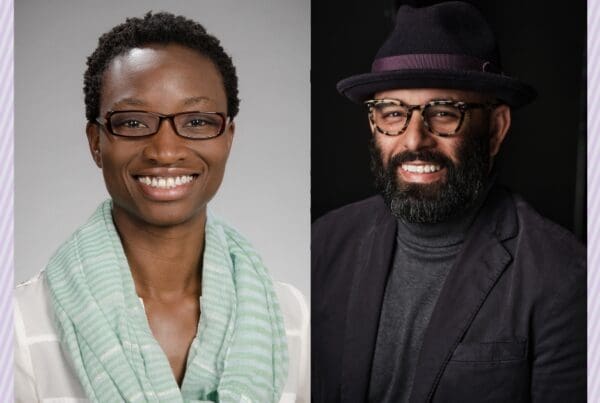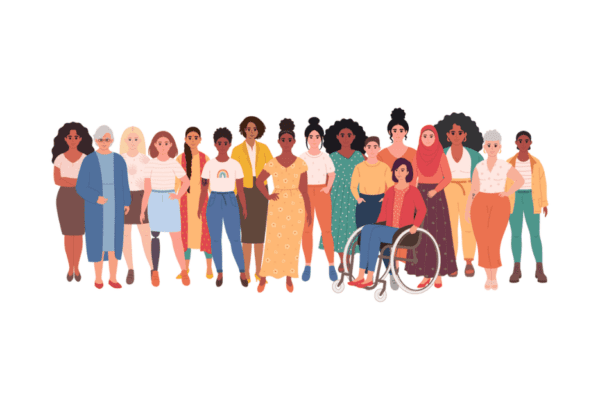Hispanic Heritage Month, celebrated each year from September 15 through October 15, recognizes the diversity of peoples of Cuban, Mexican, Puerto Rican, South and Central American, Indigenous and other Latin American cultures or origins. People with ties to these countries may identify as Hispanic, Latino/a, Latinx, Latine, or something else as these terms evolve and change. While annual celebrations may group everyone together, it’s important to recognize that there are many differences as well as similarities.
Here, employees share their thoughts on Hispanic and Latinx representation at UW Medicine and their favorite cultural traditions.

Rose Cano
Rose Cano, she/hers/ella, Diabetes Navigator/Cultural Case Mediator, Interpreter Services, Harborview
There are many cultures, climates and languages within Peru. There are three vast regions: the long desert-like coast, the Andes and the jungle (including the Amazon). The people differ widely. Each region has their own cuisine, which is why I think our food is the best in the world. We have an amazing variety of fruits and vegetables. Pisco is from Peru. A city on the coast of Peru founded in the 1500s bears the same name.
I love so many Peruvian traditions. Among my favorites are: El Son De Los Diablos parade dance (Afro Peruvian tradition), zapateo (stepping), baked bread in the shape of a baby called a “wawa” for certain celebrations in the Andes, the biggest meal of the day at 1 p.m. called “almuerzo,” bread and tea at 7 p.m. called “lonche.”
To support Hispanic and Latinx communities, UW Medicine should offer the ENTIRE after visit summary in Spanish as well as appointment text reminders and phone reminders in Spanish.
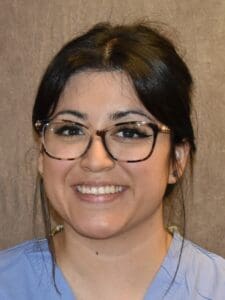
Analaura Correa
Analaura Correa, she/her, Respiratory Care Lead, UW Medical Center
I am a first-generation Mexican-American daughter of two immigrant parents. I was born and raised in El Paso, Texas, but I spent a lot of my childhood back in Mexico with my extended family. My parents are from Mexico City, and my summer breaks growing up consisted of taking 20-plus hour road trips all over Mexico. Spanish had been my primary language until the age of 9. We then moved further into Texas where I had the opportunity to learn English via ESL classes. This was a difficult transition for me, but today I am extremely thankful to be fully bilingual.
One of my favorite Mexican cultural traditions includes the festive holidays during Christmas time. This time usually entails weeks of celebration and community parties (posadas) all around the country. It’s a time full of family, friends and delicious food such as tamales. This year I will have the opportunity to go celebrate the holidays in Mexico with my family, which is something I haven’t done since I was a child, and I am extremely excited.
UW Medicine can continue to support Hispanic and Latinx communities and employees by spreading cultural awareness and appreciation among colleagues as well as creating new ways to participate in community partnerships with Latin organizations. It is important for UW Medicine to engage in open dialogue with Hispanic and Latinx employees to continue to understand their specific needs and preferences. This will help to best serve our communities.

Ixallana Garcia
Ixallana Garcia, she/her, Registered Medical Assistant, UW Medicine Latinx Diabetes Clinic
I am truly proud to be of Hispanic descent. From a young age, I learned that building a better life, having strong family values, compassion and an incredible work ethic is the true definition of my culture. My culture has shaped me into the person who I am today.
The Latin/Hispanic cultures are diverse and have various traditions. It is difficult to pick which ones are my favorite. One of them being Rosca de Reyes, also known as “Three Kings Day” or “Epiphany.” On Jan. 6, families cut into a massive ring-shaped sweet bread that has a hidden plastic baby. It’s tradition to make tamales for everyone on Feb. 2 if you get the baby in your piece of bread. Another favorite tradition is celebrating life after death. When someone passes away in the Hispanic/Latin culture, we don’t simply forget about that person. Family and friends gather around great food to discuss memories they had with the deceased, and traditionally, a nine-day prayer is held called a “rosario.” It helps to bring a sense of peace and rest not only to the family but also to the person who passed away.
UW Medicine could further support my culture by adding more services in other departments like the LatinX clinic here at the UW Medicine Diabetes Institute that will help make Hispanic/Latin patients feel more welcomed, more heard and better cared for.
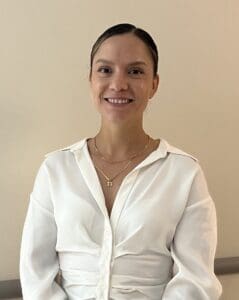
Marisa Gonzalez
Marisa Gonzalez, she/her/hers, Program Coordinator at UW Medical Center Surgical Specialties
My favorite cultural traditions are around family and friends, whether a birthday with a pinata and tres leches cake, posadas and Christmas Eve with the grandparents and extended family enjoying sweet churros or a Sunday with the family gathered after church Mass. No tradition takes place where people are alone; you are always surrounded by family, friends and food.
Communication and compassion are key. Coming from a very warm and welcoming culture is a clash that we face when arriving to a cold cultural country. Having more Spanish-speaking staff from top to bottom (from doctors to the front desk) and communicating this as a service provided for the Hispanic community would very much support and ease the worries and even the fear of going to the hospital and not being able to understand/communicate properly.
Also creating a group for staff to connect and create community would help people like me that are new arrivals to the U.S. and would benefit very much from others’ knowledge and experiences.

Diana Guillen
Diana Guillen, she/her/ella, Regulatory Affairs Manager, UW Medical Center
Being a Mexican American isn’t easy especially as a first-generation student and professional. My hope is that people recognize how hard working Latinx communities are and the challenges that come with trying to grow in a system where you’re either the first in your family to achieve a certain milestone or do not see many people who look like you. This has had a big impact on me personally. I encourage you to show love and appreciation to your Latinx colleagues because often people do not know our stories and struggles. I personally have experienced the separation impacts of immigration on my family, and it has truly molded me into the person I am today.
Where my roots stem from is Chiapas in southern Mexico (recommend you visit Chiapas, specifically Cascadas de Agua Azul, ruins in Palenque and San Cristobal de las Casas, pueblo magico). We usually spend time at the family ranch; the clarity of the stars, the smell of the air, the food, the music are just amazing. I love folkloric dance that differs from state to state. Most importantly, I love the people! How warm and welcoming no matter if you’re a stranger, you’re treated like family. In Mexico, my younger sister and I refer to elders as we greet them as “tia/tio,” which translates to aunt/uncle. That bond and familial ties are what I treasure most.
I would like to see UW Medicine invest resources into developing prospective and emerging leaders within the system who come from underrepresented communities. I have had the privilege and honor to be a part of the first cohort of the BIPOC Development Program, which has created a sense of community, empowerment and knowledge sharing. I would like to see that program continue to be supported as well as tailored training to prospective and emerging leaders and/or possibly mentorship programs.

Darlin Lozano
Darlin Lozano, they/she/ella, LGBTQ2S+ Program Manager, Office of Healthcare Equity
I am Cuban. I was born in La Habana and immigrated to the States when I was 3 years old. My specific lineage and ancestors are Chinese, Indigenous and African as a result of forced labor migration and the Trans-Atlantic slave trade. A common kaleidoscope of identities that many of us hold across Latinidad. I am queer and non-binary and from this place I reimagine what it means to be Latinx.
Yo soy de mar y arena, rooted in the earth and sea. From this deep connection, I strive to nurture and grow my community. I engage with the land around me, learning the names and medicinal properties of the plants that thrive in my immediate environment. Knowledge that allows me to care for my community in meaningful ways. These teachings are especially precious to me y los llevo en mi corazón. Recognizing that they are the heirloom of the Ciboney, Taino and Arawak people. It’s an honor to carry forward these traditions and values as a part of my own journey.
When I think of our shared traditions across Latinidad, I think of the ways in which we have created literary masterpieces and rhythmic revolutions. The language we give to love, the songs we sing for liberation and the way we dance in its wake. I love being Cuban, and I deeply understand the responsibility of decolonizing our traditions and culture.
I would like to see greater representation of historically marginalized Latine people (indigenous, non-white, gender diverse) throughout UW Medicine as a result of intentionally creating structures that support their advancement.
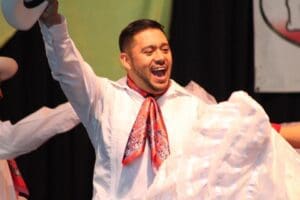
Federico Olivas
Federico Olivas, he/him/his, Assistant Director of Respiratory Care Services and Pulmonary Function Labs at UW Medical Center
When it comes to cultural traditions, I’ve got a soft spot for holidays and celebrations. These events are like treasure troves of various customs, from digging into delicious foods to busting out some sweet dance moves. Personally, I’m all about classic treats like tamales, carne asada and pozole — they really hit the spot. But what’s really kept me connected to my roots is dancing.
I moved to the United States when I was pretty young, so fitting into the new culture was a bit of a journey. While I managed to blend in, truly feeling like I belonged was a bit tougher. It wasn’t until I started getting into traditional Mexican dances, especially Folklorico, that I found my groove and a crew of people who felt the same way. Nowadays, I’m not just dancing for myself; I’m sharing a slice of my culture with others, especially those who are far from home and looking for a sense of community. Our dance crew is like a haven for those who are seeking that connection.
At UW Medicine, there’s an opportunity to give more support to the Hispanic and Latinx communities as well as the folks working with us. Setting up spaces where we can have honest conversations about our ups and downs could go a long way in fostering understanding and breaking down stereotypes. I’d also love to see a shoutout for the behind-the-scenes folks who might not be in direct patient care but play a crucial role.
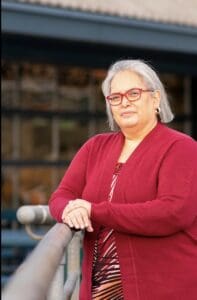
Susana Orozco
Susana Orozco, she/her/hers, Adult Medicine Clinic Manager, Harborview Medical Center
More than cultural tradition, what makes me a proud Mexican American is the resilience and strong sense of community that is a hallmark of Latinx community. Growing up in Eastern Washington, I witnessed as my parents persevered to make a life in the United States for my siblings and myself. No matter how tough the situation, my parents were able to push through and often found support among other immigrant families. This uplifting supportive mindset is something I have tried to embody throughout my life both personally and professionally.
UW Medicine can continue to promote events where employees can share their heritage. Feeling heard and represented goes a long way and not just during Hispanic Heritage Month. Ideally this open dialogue would help members of the Latinx community feel included within UW Medicine and ultimately empowered to continue pursuing their career goals within the organization.
Mexican Independence Day is Sept. 16 and not Cinco De Mayo, as popular culture may portray. Take a moment to read about the rich and complex history of Mexico and discover the different regions that make up Mexico.
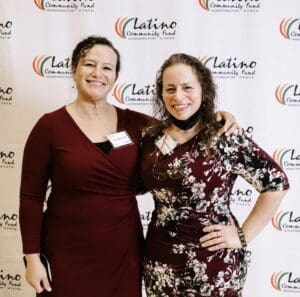
Tania Zapata-Garcia (left) with her sister
Tania Zapata-Garcia, she/her/ella, Clinical Laboratory Technician, UW Molecular Virology
I was born in Panama, which has many cultural traditions; most of my favorites are food-based. One non-food is the traditional dance and clothing. When I was a child, I danced in a montuna [traditional dress] with my siblings to traditional music. I also grew up eating arroz con pollo (for special occasions) along with potato salad with beets, arroz con coco con guandu and ojaldre (fry bread).
I was raised with fairly strict rules about respecting elders, and it was expected to kiss someone on the cheek even when meeting them for the first time. I think this is similar in other countries so I often feel that I relate more to other immigrants than to people born in the U.S.
I appreciate that UW Medicine supports this platform to learn more about the Hispanic and Latinx communities. The lab I work in does not have many Latinos so it’s nice to learn about others in various departments. Genuine interest, respect and opportunities to learn about one another are very important in all communities.
